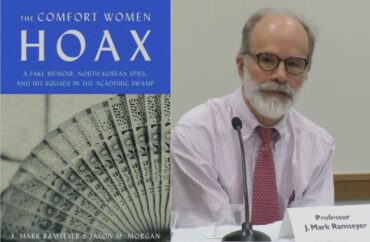
“No one tweets articles by Ramseyer.”
Until Professor Mark Ramseyer writes an academic paper challenging the claim that Korean women were forced into prostitution by Japan during World War II.
Then the Harvard corporate law professor gets accused of being a racist and gets compared to the lunatics who massacred people in Buffalo and Atlanta.
That is the lesson Ramseyer details alongside co-author Jason Morgan in “The Comfort Women Hoax,” a new publication out by Encounter Books and provided to The College Fix. (Morgan, a professor at Reitaku University in Japan, is a former College Fix reporter). Morgan has also written on the comfort women controversy.
Most of the supporting evidence for claims of forced, or at least coercion are based on a fictitious book by a Japanese communist, as detailed by Ramseyer and Morgan.
Some parts of the story have been detailed by The Fix and other media outlets, but the book gives more detail than could ever be covered in an article.
The book makes clear that Ramseyer was not arguing in favor of prostitution.
“We cannot stress this strongly enough: we make no normative claims about prostitution,” the authors write.
This academic approach did not stop students and professors from coming after them, some in collegial ways and others in less professional means.
Ramseyer’s paper “does not fall under the protection of academic freedom,” The Crimson opined. He was guilty of “dangerous lies,” the student newspaper wrote.
Others, including dozens of campus groups, students, and other affiliates, demanded an apology from Ramseyer in a February 2021 petition.
A letter from the Harvard Undergraduate Council went further, comparing Ramseyer’s paper to the killing of Asian women at an Atlanta spa.
The paper’s “harrowing misogyny” linked it to the killer in Atlanta – “it is difficult or us to separate the atrocity of [the killings] with the atrocity of his claims in this article, as they perpetuate harmful ideas that played a key role in the March 16th shooting.”
The reader can decide for themselves what is reasonable, what is unwarranted, and if a cancel campaign occurred. The Fix contacted a handful of the professors for comment and those comments can be read below.
Morgan faced cancellation before Ramseyer – as a graduate student he faced a cancel campaign by his own advisor and other members of his department. His account is detailed in the book and will likely be the subject of a future Fix article.
“I have not received any apology from anyone involved in the Great Comfort-Women Cancellation, and I do not expect to,” Morgan told The Fix via email. “People with functioning consciences do not shut down debate in the first place, do not lie and then hide behind titles and promotions.”
MORE: These six professors didn’t let cancel culture stop them
“The reality of the American humanities today, sadly, is that Stalinism is the default mode of operation,” he said. “People who protect their own careers whatever the cost in truth and conscience simply do not apologize.”
“They do not have the soul-level capacity to reflect and be sorry,” he said. “Acting with moral integrity does not occur to such people.”
“What happened to Professor Ramseyer was orders of magnitude worse than what happened to me,” he said. “I doubt very seriously whether he will ever receive an apology either, for the same reasons I just gave.”
Ramseyer said the past three years were “lonely” but thanked those of his peers who stood by him.
“For the most part, my law school friends stood by me. They reached out to meet me for lunch or coffee, to let me know that they were still my friends,” Ramseyer said. “My friends in Lexington (where I live) stood by me. All this made a huge, massive difference. Friendships really, really matter.”
Academics say campaign against Ramseyer isn’t part of cancel culture
The Fix spoke to some professors involved in the criticism of Ramseyer, including one, who the book argues, was outside of his expertise.
The book mentions Harvard Professor Andrew Gordon as one example. As written in the book, Gordon’s “most recent book was a history of sewing machines in Japan.” He wrote a criticism together with Carter Eckert, another Harvard historian, as part of a retraction campaign.
Gordon and Morgan had clashed before over comfort women, in 2015.
The Harvard historian wrote a textbook in 2014 about Japanese history but relied on sources that drew from the debunked book by communist Yoshida Seiji. Seiji had admitted nearly 20 years prior that he had invented the claims of forced prostitution. “Fairly obviously, Gordon does not know the field,” Ramsey and Morgan wrote.
Others who organized against the comfort women paper did acknowledge the Seiji hoax.
The Fix emailed Professor Gordon to ask him about his general process for evaluating sources as well as his knowledge of comfort women prior to this controversy. The Fix also asked him if he wanted to provide additional comments about the situation and for his general thoughts about how professors should respond to different viewpoints.
“I believe the two statements below, both by me and my colleague, Carter Eckert, address the gist of your questions, and I have nothing further to add,” Gordon wrote back, providing two statements on the situation.
Others appeared to take joy in being in a “woke cancel mob.”
“I did not think—when I decided to be a historian of early modern Japan—that it would be so thrilling and high-stakes and full of heart-pounding adrenaline and panic,” Northwestern University historian Amy Stanley tweeted during the controversy.
“I always thought joining a woke cancel mob would be easy and fun. I didn’t realize it would involve so much intense reading and analysis of historical sources,” Professor Stanley wrote a few weeks later. However, according to the book, she said she was joking. She also approvingly replied to a tweet from University of Texas historian Mark Ravina that called a group of scholars “academic assassins.”
The Fix asked Professor Stanley what else she had read or written about comfort women in the past several years, if there was anything about the Ramseyer situation that she believed was misunderstood, and any other comments on her reaction.
She told The Fix via email:
Yes, I do a lot of research and reading on this topic, including going back and re-reading books I’ve already read. As new work comes out, or you find out new things in the archive, it’s important to go back and look at the previous scholarship again, because you may have missed something. You also want to be precise about how your work agrees with or challenges what has already been written.
She also provided The Fix with a syllabus from a 2022 class she taught on comfort women.
“I don’t believe asking a journal to retract a paper because of a misuse or distortion of evidence is the same as ‘cancellation,’ which is more about being offended by the argument and trying to silence the author,” she said.
“I think it’s very important to distinguish between an argument that is controversial or offensive and an argument that misuses or misrepresents evidence,” she said. “Those are two different things.”
“I also think it’s important to distinguish between criticizing an article, even asking for it to be retracted, and trying to get a person fired from his job, calling him names, ridiculing him, or sending him hate mail,” Stanley said. “The focus should be on the work, not the person.”
She said “criticism and vigorous debate are necessary parts of academic life” and she was glad that Ramseyer was not fired nor blacklisted. “I think that is as it should be. I don’t like to be criticized, either, but it’s important not to be oversensitive: free speech is an important value.”
Professor called paper an ‘academic fraud’
University of Connecticut Professor Alexis Dudden also regularly took to Korean programs to criticize Ramseyer.
During a February 2021 interview she said:
I actually thought I was misreading the opening sentences. That words were missing, to be very honest. And then I started shaking, because I couldn’t understand why a professor would make such unfounded claims, when so much evidence proves the contrary.
She also called the paper “academic fraud” after making those comments.
“It’s just fake news dressed up as fact,” Dudden said of her former professor’s work.
The book relates that Dudden has claimed that she met a comfort woman in 2000 who showed her where a breast had been cut off, a claim the book called “implausible.”
“If a soldier had mutilated a comfort woman in the ways described, she would have been lucky to make it even to an army field hospital,” the book states. “She would have lost massive amounts of blood.”
The Fix asked Dudden the same questions asked of other professors about her views on the controversy and how professors should respond to disagreement.
She told The Fix via email:
Thank you for your interest in the very important issue of Japan’s history of state-sponsored militarized sexual slavery and ongoing attempts to deny this well-documented past and to take formal state responsibility for it.
As you likely know, countless scholars have produced evidence of this history, and we collectively continue to publish and teach about it.
Thank you, moreover, for taking seriously the articles I and many others have contributed in rebuttal of the Ramseyer/Morgan debacle. I appreciate an open and honest discussion as a profound believer in academic freedom of speech and the responsibilities that are accorded this privilege. In particular, those of us interested in the truth about this history – as well as its ongoing effects on survivors – know from instances of similar practice around the world today that the point of learning from Japan’s history of state-sponsored sexual slavery learn how to prevent the targeted use of rape and sexual violence as a weapon of war and oppression.
She also provided a link to the March 2021 response, where she called Ramseyer the “worldview” in his paper “racially essentialist, revanchist, and history-denying, resonant with similar movements around the world such as Trumpism, LePenism, Modi-ism, and so on.”
Fellow Harvard law Professor Jeannie Suk-Gersen made clear in her comments she never called for, nor wanted, Ramseyer to be canceled.
She told The Fix:
I unequivocally support Ramseyer’s exercise of academic freedom to explain himself after being criticized and accused by Japanese historians of lapses of academic integrity. If criticizing me is helpful for his response to critics, I say, have at it. All of that writing and criticism is what academic freedom is for: to enable the search for truth.
Criticizing someone’s academic work is not canceling them, of course. Engaging with someone’s work and reporting scholar’s views about flaws in the work is not attacking their academic freedom – indeed that is what academic freedom is for.
She said she has “never called for the retraction of any paper.”
‘Get a library card instead’ Final thoughts from Morgan
Reflecting on the controversy, Morgan provided The Fix with his advice to students.
“Young people who are intellectually curious should avoid most American colleges and universities altogether,” he said. “Get a library card instead. Better yet, come to Japan. There’s a vibrant life of the mind out here.”
“No indoctrination, just mostly respect for scholarly inquiry and tolerance for various views. Imagine college life with no cancel culture! Take my classes and let’s have a wide-open discussion!”
MORE: Check out the Campus Cancel Culture Database
IMAGES: Encounter Books; Harvard Law School/YouTube
Like The College Fix on Facebook / Follow us on Twitter






Please join the conversation about our stories on Facebook, Twitter, Instagram, Reddit, MeWe, Rumble, Gab, Minds and Gettr.